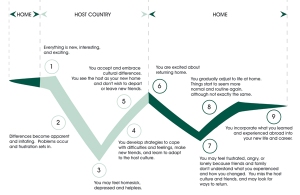Culture shock happens to every one who visits a new country. It even happens to some people who visit a new part of their own country. No two individuals are the same, so when two different people interact, misunderstandings occur. As I was thinking about our experience teaching in Korea, I was wondering how our interaction with the Korean culture has compared to others. I found a graph that generalizes culture shock for people of any culture visiting another culture. Most of the time culture shock does not set in while visiting as a tourist, though incidents still do happen. It usually takes 2 or more months before you start to notice culture shock.
 As I was looking for a graph or picture to use for culture shock, I did not find one that matched perfectly with our situation. Again all people are different, so each person will have a different experience. So I will try to elaborate a bit about this graph in light of our experience.
As I was looking for a graph or picture to use for culture shock, I did not find one that matched perfectly with our situation. Again all people are different, so each person will have a different experience. So I will try to elaborate a bit about this graph in light of our experience.
Stage 1 (Honeymoon Stage)–The initial excitement and interest in Korea lasted for a few months. Though there were ups and downs, we enjoyed having a job, being in a new culture, and being able to travel to new places. Some foreigners really like Korean food. We are not a huge fan of Korean food so the new food excitement died out quickly. Traveling was fun, until it became too much of a hassle to travel with 10 million other people. And our city is small, so the list of new things to do ran out quickly.
Stage 2–We researched as much as we could about Korea before coming here, so we knew some of what to expect as far as differences. We noticed the differences immediately and were able to handle them pretty well. Communication has certainly been one of the biggest cultural frustrations.
Stage 3–This stage is certainly the hardest for people to understand unless they have gone through it. At times you feel like you are stranded on an island with no friends and no communication with the outside world. A person can become depressed and want to leave the culture. Many teachers in Korea have quit after only a few months because of culture shock and other factors.
Stages 4, 5, & 6–These three stages blend together for some people. Like I mentioned earlier we have adapting to many of the changes in culture. We have not embraced much of the culture because I personally have not found much worth embracing. Since we teach in a smaller city, we also have not been able to make many friends either Koreans or foreigners. Therefore, we do not see this as our home and will not be as sad to leave friends. We certainly are excited about returning to America, but we will miss one or two things about Korea.
Stages 7 & 8–Though we have yet to experience these stages, they are the most surprising stages to see. I have heard much about theses stages and have experience them on a small level. Visiting new places gives people excitement and experiences that they want to share with others when they return, but often that excitement does not carry over to the listeners. The people who did not travel do not understand this excitement. They have been living their lives and they often are not as interested in the other person’s experiences. Though we may miss a few things about Korea, we will probably not have any desire to return.
Stage 9–We certainly learned a great deal about business, teaching, traveling, and interacting with people. Incorporating these new lessons into our life will help in many areas. For better or worse, we have learned many valuable lessons.
I found these helpful tips online for helping to lessen culture shock in Korea:
1. “Know what to expect”–Do research. There are thousands of books and websites to learn about Korea.
2. “Learn the language”–Learning how to read Korean characters is actually pretty easy and allows someone to learn basic Korean words. Learning Korean grammar is almost impossible though from what I have heard.
3. “Find a hobby or something to do in your spare time”–Most English teachers actually have quite a bit of times on their hands.
4. “Make a network of friends”–This is hard to do in a small city, but is worth looking into at least.
5. “Meet Korean people”–Most Koreans love having foreign friends and want to help out as much as possible.
6. “Take advantage of Korean’s unique traits”–There are many unique things in Korea, try some new things.
